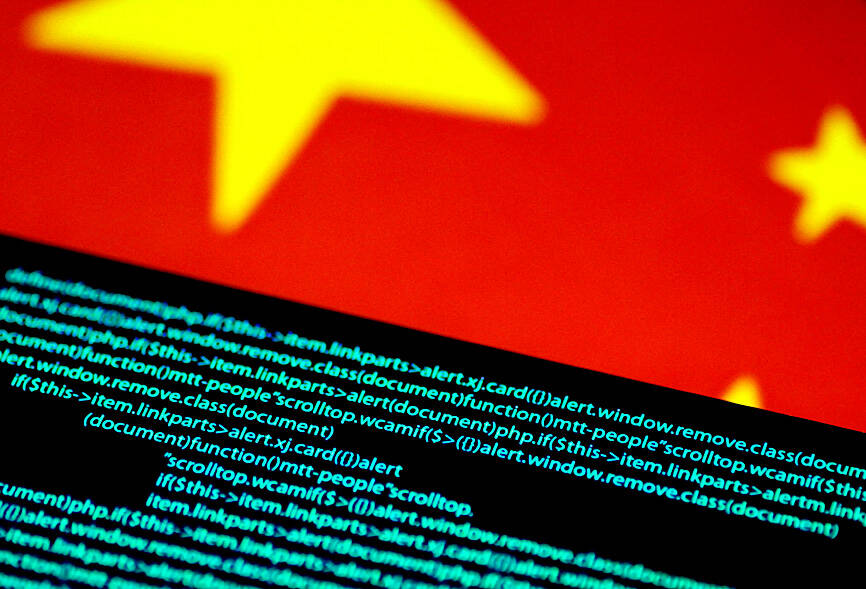China uses influencers to spread disinformation in Taiwan through social media such as TikTok and YouTube, aimed at creating suspicion and sabotaging Taiwan-US relations, but it is difficult for the government to assign an agency to regulate online activities, a government official said yesterday.
In an effort to prevent the Chinese Communist Party (CCP) from using TikTok to spread disinformation and threaten national security, the Cabinet late last year called for cross-ministerial meetings, but such meetings have not yet been held due to the Cabinet reshuffle this year, the government official said on condition of anonymity.
The Cabinet led by former premier Su Tseng-chang (蘇貞昌) banned the use of short video platform Douyin, the Chinese version of TikTok, on government devices, but there has been no further discussion about other methods to combat threats since the Cabinet reshuffle in January, the official said.

Photo: Reuters
The issue involves free speech censorship and content management, so the government must be very careful, the official said, adding that the EU also began banning TikTok on government devices.
India has banned TikTok entirely, but short videos posted on TikTok can still be shared to other streaming platforms, and if the government wants to ban specific content, it must carefully consider whether it would be effective, the official said.
Taiwan is still evaluating the issue, while referencing the methods adopted by other countries, they said.
There is a government authority supervising radio and television broadcast content, but with the draft “digital intermediary service act” suspended, there is no government authority monitoring online activities, the official added.
Asked if the Ministry of Digital Affairs could become the authority to manage the issue, the official said the Information and Communication Security Management Act (資通安全管理法) and the Personal Data Protection Act (個人資料保護法) cover the operations of several ministries, so it is difficult for only one agency to regulate online activity.
China uses “united front” tactics, cognitive warfare and infiltration campaigns to divide Taiwanese society, and tries to sabotage the relationship between Taiwan and like-minded countries, the Mainland Affairs Council said.
To prevent external forces from infiltrating Taiwan, the government would continue to collect opinions about whether to amend the Anti-Infiltration Act (反滲透法) to require social media influencers to make the source of their funding public, the council said, adding that such action could help maintain national security and social stability.

An essay competition jointly organized by a local writing society and a publisher affiliated with the Chinese Communist Party (CCP) might have contravened the Act Governing Relations Between the People of the Taiwan Area and the Mainland Area (臺灣地區與大陸地區人民關係條例), the Mainland Affairs Council (MAC) said on Thursday. “In this case, the partner organization is clearly an agency under the CCP’s Fujian Provincial Committee,” MAC Deputy Minister and spokesperson Liang Wen-chieh (梁文傑) said at a news briefing in Taipei. “It also involves bringing Taiwanese students to China with all-expenses-paid arrangements to attend award ceremonies and camps,” Liang said. Those two “characteristics” are typically sufficient

A magnitude 5.9 earthquake that struck about 33km off the coast of Hualien City was the "main shock" in a series of quakes in the area, with aftershocks expected over the next three days, the Central Weather Administration (CWA) said yesterday. Prior to the magnitude 5.9 quake shaking most of Taiwan at 6:53pm yesterday, six other earthquakes stronger than a magnitude of 4, starting with a magnitude 5.5 quake at 6:09pm, occurred in the area. CWA Seismological Center Director Wu Chien-fu (吳健富) confirmed that the quakes were all part of the same series and that the magnitude 5.5 temblor was

The brilliant blue waters, thick foliage and bucolic atmosphere on this seemingly idyllic archipelago deep in the Pacific Ocean belie the key role it now plays in a titanic geopolitical struggle. Palau is again on the front line as China, and the US and its allies prepare their forces in an intensifying contest for control over the Asia-Pacific region. The democratic nation of just 17,000 people hosts US-controlled airstrips and soon-to-be-completed radar installations that the US military describes as “critical” to monitoring vast swathes of water and airspace. It is also a key piece of the second island chain, a string of

The Central Weather Administration has issued a heat alert for southeastern Taiwan, warning of temperatures as high as 36°C today, while alerting some coastal areas of strong winds later in the day. Kaohsiung’s Neimen District (內門) and Pingtung County’s Neipu Township (內埔) are under an orange heat alert, which warns of temperatures as high as 36°C for three consecutive days, the CWA said, citing southwest winds. The heat would also extend to Tainan’s Nansi (楠西) and Yujing (玉井) districts, as well as Pingtung’s Gaoshu (高樹), Yanpu (鹽埔) and Majia (瑪家) townships, it said, forecasting highs of up to 36°C in those areas